Col de Chavière
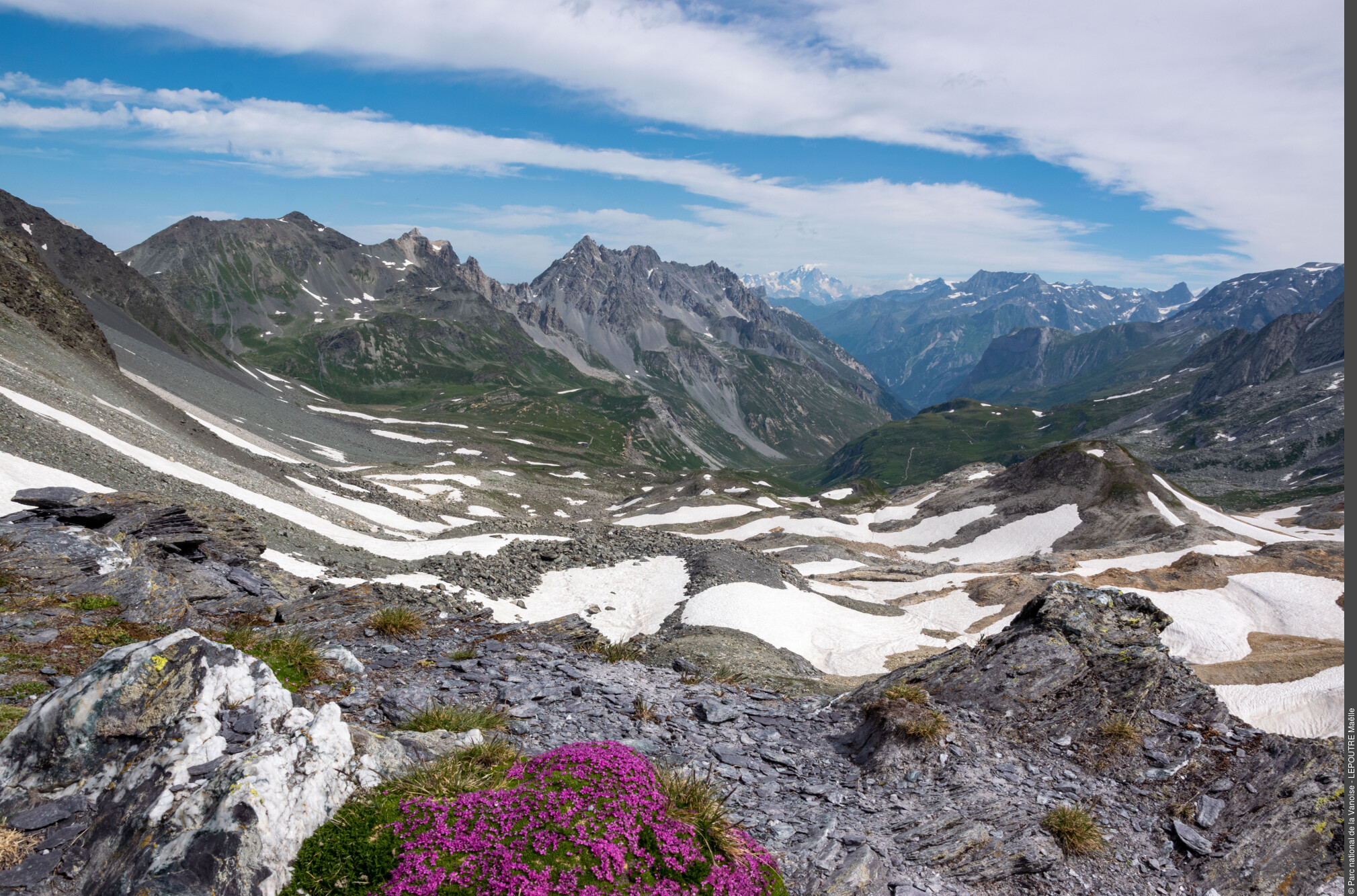
SAINT-ANDRE
Col de Chavière
Easy
7h
13,5km
+1018m
-1018m
Return
Embed this item to access it offline
Ÿou climb into the privacy of a small authentic valley. After the hamlet you cross a sparse forest before reaching the alpine pastures. Then you roam through a mineral landscape where you will be rewarded with a 360° view of the Vanoise glaciers.
Description
"From the car park, follow the road, cross the bridge straddling the Polset stream, then take the track on the left. Cross the hamlet of Polset. At the end of the hamlet, leave the track to take a path on your right signposted by the National Park: Lac de la Partie, Col de Chavière. Gradually climb through a forest. Arrive at the Source du Vin. Continue along the trail that winds through the alpine pastures, passing in front of a shepherd’s chalet. Merge onto a crossing of the trail, take the left still following the sign for ""Col de Chavière"". Ÿou can make a detour by the Lac de la Partie located below the trail to the east. Continue climbing through the cargneule terrain then through a long scree, sometimes covered with late névés. Ÿou have arrived. Turn back to retrace your steps to reach the departure point."
- Departure : Polset car park in Modane
- Arrival : Polset car park in Modane
- Towns crossed : SAINT-ANDRE and MODANE
Forecast
Altimetric profile
Recommandations
Presence of a late névé at the edges of the pass. Bypass it and avoid undertaking it when the snow is still very hard.
Is in the midst of the park
The national park is an unrestricted natural area but subjected to regulations which must be known by all visitors.
Information desks
Maison Cantonale, 9 Place Sommeiller, 73500 Modane
Transport
"
Rail connection to Modane. Information: www.voyages-sncf.com
Suggested hitchhiking organised in the Haute-Maurienne valley. Information: www.rezopouce.fr
"Access and parking
From the exit of the A43 motorway, take the direction of Modane. At the Freney roundabout, take the RD 106 towards the Refuge de l´Orgère which is signposted. Cross the village of Saint-André, the hamlet of Col and park in the car park located below the hamlet of Polset.
Parking :
Polset car park in Modane
Accessibility
One disabled car park space available.
- Emergency number :
- 114
10 points of interest
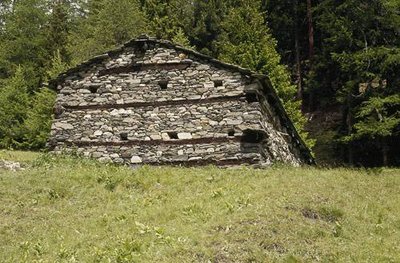
Chalet d'alpage avec linteaux en bois. Polset, Modane. - PNV - MOLLARD Maurice  Architecture
ArchitectureHamlet of Polset
The climate and local materials have brought about a special know-how in the construction of buildings, which are built on an East-West orientation, supported and well hung on the slope. The buildings take advantage of existing boulders and natural hollows to provide shelter from avalanches and the wind. In Polset, an interesting fact is that the builders combined both stone and wood. Beams embedded in the masonry form a chain that surround the building to strengthen its cohesion.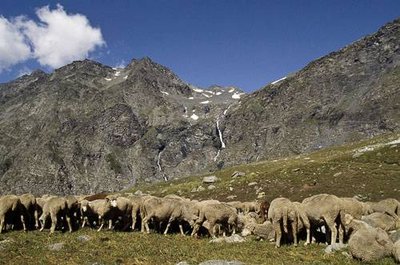
Troupeau de brebis en alpage. - PNV - GOTTI Christophe  Pastoralism
PastoralismPasture land
The Vanoise is also an agricultural land. This pasture is currently used by sheep in the summer. These sheep are transhumant originating from the south of France. This pastoral vocation is old and the chalets are proof of it. Carrying on this activity is important for keeping the open spaces that are habitats for many species.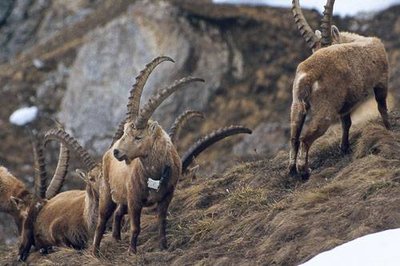
Harde de bouquetins mâles. - PNV - CHASTIN Alain  Fauna
FaunaWintering grounds of the chamois and ibex
Thanks to their southern exposure and their steep declivity, the slopes above the hamlet of Polset are replete with chamois and ibex during the winter months. The steep terrain and its predominantly southern exposure facilitate the clearance of snow and allow the ungulates to quickly find the grass that is vital to their winter survival.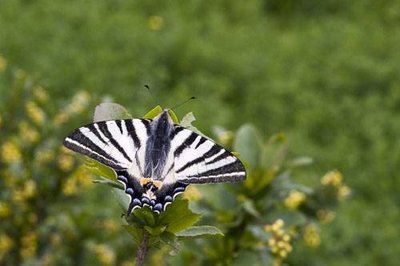
Flambé sur une Èpine vinette. - PNV - LACOSSE Pierre  Fauna
FaunaThe scarce swallowtail
Large, generally pale yellow with black stripes that cut through its wings, it is easy to spot even in full flight. It tends to hover in flight. A beautiful butterfly that can’t be missed, it loves warm, herbaceous and slightly bushy areas with rocky outcrops. The Polset valley has a wealth of assets to welcome this butterfly.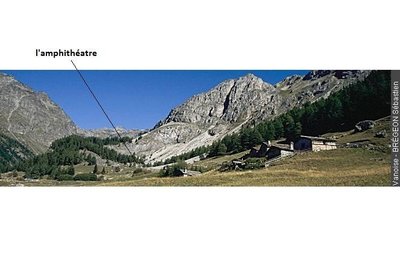
 Geology
GeologyThe amphitheatre
First stop to observe the “stones”. Strata are visible, so we have a sedimentary rock. 300 million years ago a chain of mountains covered what was to become France. Eroded, it left space for a warm, shallow sea. At the bottom of this sea, the sediments were deposited and our rock began to form between -240 and -233 million years. In 7 million years a rock thickness of about 150 m was created. We can only see about 5 metres here. It is grey limestone. The uplift of the Alps 80 million years ago moved and carried this rock to where we walk today.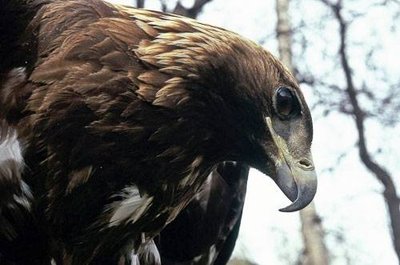
Aigle royal. - PNV - MOLLARD Maurice  Fauna
FaunaThe eagle and festooning.
The cliffs above Polset have provided nesting for the golden eagle. If the eyries (nests) are poorly visible, the eagles can still be seen during the mating season when they put on magnificent displays. During these displays, the eagles fly through the skies tracing the curves of a parabola, soaring rapidly then diving. It is said that the eagles festoon. The period running from March to April is the best time to see this wonderful spectacle.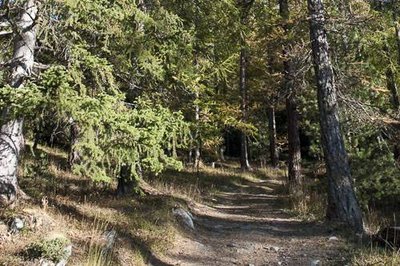
Ambiance forestière à Chantelouve. - PNV - JOURDAN Jérémie  Flora
FloraThe high-altitude forest
The mountain forests, which like the one occupying the Polset valley, consist almost entirely of coniferous trees. These trees are in fact more resistant to the cold. The selection of species is influenced by the air humidity; at around 1,800 m, you will find the spruce, which then gradually makes way for the fir, and then in turn gives way to the larch and cembro pine on the southern slopes. Of course, the boundaries are not clear and we usually find a mixture of these four species with a predominance of one depending on altitude or exposure.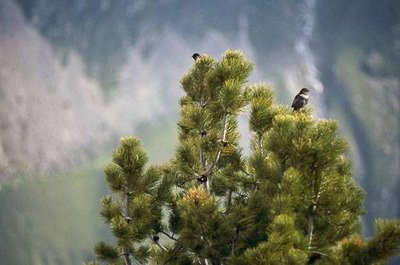
Merles à plastron posés sur un pin cembro. - PNV - CHARRON Julien  Fauna
FaunaThe ring ouzel
It is easy to identify because it assumes the plumage of the common blackbird. It is distinguished by its large white bib on the breast and clear edging on the feathers of the wings and the belly. This wild, fast-flying mountain thrush inhabits the edges of the larch, Scots pine, spruce and cembro pine forests between 1,000 to 2,500 metres in altitude. Ÿou will easily notice this bird at the tops of the trees where it loves to perch!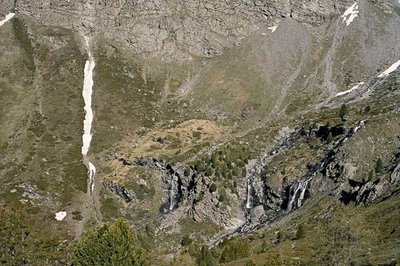
La cascade du Ruisseau Noir (à g.) et les cascades du Ruisseau Blanc (à dr.), vues depuis le sentier GR55. - PNV - VON CONTA Beatrix  Water
WaterThe Polset waterfalls
From the seasonal melting of the Chavière glacier, the water flows gently before gushing over the walls at a height of about 100 m. After a brief moment of respite where the stream winds through lush vegetation, it plunges again over a succession of falls which, although not as high, are equally as pretty. It is quite surprising to see the variations in colour and flow of these waterfalls that can be seen on the same the day.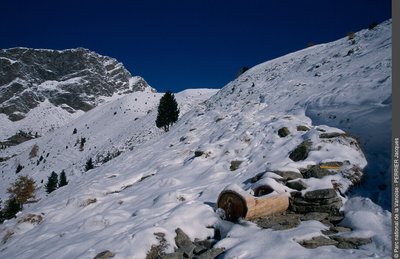
Bachal près de la Source du Vin - Jacques PERRIER  Water
WaterThe Source du Vin (source of wine)
This small spring, which obviously dœs not produce wine, was set up by the workers of the National Park to offer a welcome pit stop on this very sunny route. The origin of the name of this place is not really known, but the most sensible explanation would be to say that it is a place where one could drink wine without restraint!
